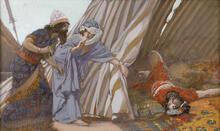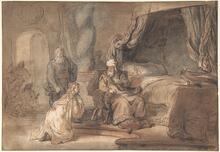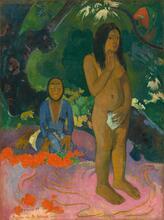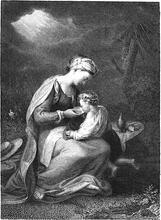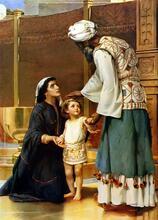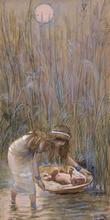Rahab: Midrash and Aggadah
The Rabbis sing paeans of praise of Rahab for her beauty and wisdom. She acted wisely when she concealed the spies in her house, thereby saving her entire family from the ravages of war. Her connection to the people of Israel was not merely utilitarian, but ensued from her love of them and their God. She converted and was married to Joshua, and her descendants included renowned kohanim (members of the priestly class) and prophets. In many midrashim Rahab comes to symbolize the positive influence Israel exerts on the surrounding Gentile nations, as well as successful conversion. Her ability to mend her ways was exemplary for ensuing generations, who used Rahab’s story to request divine mercy and pardon for their actions.
Rahab the Harlot
The A type of non-halakhic literary activitiy of the Rabbis for interpreting non-legal material according to special principles of interpretation (hermeneutical rules).midrash includes Rahab among the four most beautiful women the world has ever known: Sarah, Rahab, Abigail, and Esther. Anyone who mentioned her name, saying, “Rahab, Rahab,” immediately lusted after her. R. Nahman responded to this: “But I say ‘Rahab, Rahab,’ and nothing happens to me!”, and was answered: “This refers to one who knows her and is intimate with her” (BT Lit. "scroll." Designation of the five scrolls of the Bible (Ruth, Song of Songs, Lamentations, Ecclesiastes, Esther). The Scroll of Esther is read on Purim from a parchment scroll.Megillah 15a).
The Rabbis describe how Rahab was ten years old at the time of the Exodus from Egypt. She engaged in prostitution during the forty years of the Israelites’ wanderings in the wilderness, until the age of fifty. Since there was no prince or mighty one who did not visit Rahab the harlot, she was well acquainted with people’s thoughts. When she reported to the spies who came to her house: “no man had any more spirit left because of you” (Josh. 2:11), she alluded to her professional knowledge of the dimensions of the people’s fears, because their apprehension affected their vitality when with her (BT Zevahim 116a–b).
The midrash recounts four disgraceful matters that are mentioned about Rahab: she is called “Rahab the harlot,” which she was. Josh. 2:15 states: “for her dwelling was at the outer side of the city wall and she lived in the actual wall”—thus teaching that she engaged in prostitution with the people from inside and with the brigands on the outside. The third thing to her discredit was her living in the land of Canaan, whose inhabitants were known to be harsh and evil.
The fourth negative item refers to her as a resident of Jericho, whose people were fated to extinction, as it was said of them: “You must proscribe them” (Deut. 20:17). Despite all this, it was stated (Josh. 6:25) that “she dwelt among the Israelites—up to this day.” Although Rahab was from the peoples of the land and the families of the earth, she saved the spies out of love of Israel and its God, and God rewarded her out of love (and protected her and her family from death) (Sifrei Zuta, Beha’alotekha 10:29).
The Encounter with the Spies
The midrash identifies the two spies sent by Joshua as Phinehas and Caleb, who disguised themselves as potters, and went about crying: “Pottery here! Whoever wishes, come and buy!” They came to Rahab’s house, and when she learned that the king of Jericho sought them, she wanted to hide the spies. Phinehas told her: “I am a priest, and priests are like the angels. An angel can be visible to people, or unseen by them, as he wishes, therefore I do not need you to conceal me. Hide my fellow Caleb, while I will stand before them, without them seeing me.” Rahab did as he asked. Consequently, Josh. 2:4 reports: “The woman, however, had taken the two men and hidden him [va-tizpeno—in the singular],” since she concealed only Caleb (Num. Rabbah 16:1).
After the danger had passed, Rahab advised the spies (Josh. 2:16): “Make for the hills, so that the pursuers may not come upon you. Stay there in hiding three days.” The midrash adds that the Divine Presence rested upon her until the Israelites entered Jericho, for she knew that they would return after three days (Ruth Rabbah 2:1).
Because Rahab was not afraid of the Israelites when they came to raze Jericho, the Rabbis applied to her Prov. 31:21: “She is not worried for her household because of snow, for her whole household is dressed in crimson”—she was not concerned, because of the “length of crimson cord” that would be the sign between them (Midrash Eshet Hayil 31:21).
Rahab the Convert
When Rahab heard of the miracles that God had performed for Israel when He parted the Red Sea for them, she wanted to cleave to Israel, as portrayed in Jer. 16:19: “O Lord, my strength and my stronghold, my refuge in a day of trouble, to You nations shall come from the ends of the earth.” When the Lord performs miracles for Israel, the non-Jewish nations shall come to adhere to Him (Ex. Rabbah 27:4).
After having engaged in prostitution for forty years, Rahab converted at the age of fifty. She said: “Master of the Universe! I have sinned with three things [with my eye, my thigh, and my stomach]. By the merit of three things pardon me: the rope, the window, and the wall [pardon me for engaging in harlotry because I endangered myself when I lowered the rope for the spies from the window in the wall]” (Mekhilta de-Rabbi Ishmael, Masekhta de-Amalek, Yitro 1). Another tradition has her saying: “Pardon me by merit of the rope, the window, and the flaxen [the stalks of flax under which she concealed the spies]” (BT Zevahim loc. cit.).
Many Rabbis viewed conversion favorably, an attitude that is reflected in exegeses about Rahab. The midrash attests that Rahab married Joshua following her conversion (BT Megillah 14b). Eight Priests; descendants of Aaron, brother of Moses, who were given the right and obligation to perform the Temple services.kohanim who were also prophets were descended from her: Jeremiah, Hilkiah, Seraiah, Mahseiah, Baruch, Neriah, Hanamel and Shalom. According to one opinion, the prophet Huldah was also among her offspring (Sifrei on Numbers, chap. 78). Other traditions also include Ezekiel son of Buzi (Sifrei Zuta loc. cit.). In another exegesis, God showed Moses before his death, through the spirit of divine inspiration, the line of prophets that would issue from Rahab (Sifrei on Deuteronomy, Chap.338).
Rahab is mentioned alongside Jethro and Naaman as positive examples of the converts who joined Israel. It is claimed that there was not a single idolatry in all the world that Jethro did not worship, and therefore when he converted, he spoke from experience when he said (Ex. 18:11): “Now I know that the Lord is greater than all gods.” Naaman made an even greater admission when he proclaimed (II Kings 5:15): “Now I know that there is no God in the whole world except in Israel!”; and Rahab exceeded him, when she declared (Josh. 2:11): “for the Lord your God is the only God in heaven above and on earth below” (Mekhilta de-Rabbi Ishmael loc. cit.).
This favorable disposition to converts is expressed in a dictum that converts who drew close to God merited being drawn closer by God. The example given is of Rahab the harlot: despite her being busy in her house (in prostitution), and her being from a people for whom the Torah she-bi-khetav: Lit. "the written Torah." The Bible; the Pentateuch; Tanakh (the Pentateuch, Prophets and Hagiographia)Torah mandates (Deut. 20:16): “You shall not let a soul remain alive,” she brought herself closer to the Omnipresent. Since she did so, God drew her closer to Him, and a line of prophets was descended from her (Sifrei Zuta loc. cit.).
An additional midrashic teaching lists a number of converts who became part of the families of Israelite leaders, for example: Joseph married Asenath, Joshua married Rahab, Boaz married Ruth, and Moses took the daughter of Hobab (= Jethro) (Eccl. Rabbah 8:10:1).
Another exegesis learns from Rahab that a sincere convert, who converts for the sake of Heaven, merits having his daughter be married to a kohen and his grandsons becoming kohanim themselves, who will bless Israel. Since Rahab the harlot brought the spies into her house and rescued them, God accounted this as if she had acted compassionately to Him. As her reward, her daughters married kohanim, the sons born to them served at the altar, and they entered the Temple and blessed Israel with the Tetragrammaton. These kohanim were Baruch son of Neriah, Seraiah son of Mahseiah, Jeremiah son of Hilkiah and Hanamel son of Shalom (Num. Rabbah 8:9).
There is, however, also a negative attitude to conversion among the sages, which also finds expression in relation to Rahab. According to this outlook, the Israelites acted improperly when they saved Rahab and her family; they rather should have proscribed them, along with the other inhabitants of Jericho. God told Israel: I said to you [Deut. 20:17]: “You must proscribe them,” but you did not do so. Instead [Josh. 6:25]: “Only Rahab the harlot and her father’s family were spared by Joshua, along with all that belonged to her.” As punishment, Jeremiah, a descendant of Rahab, would come and do to them things that were [Num. 33:55] “stings in your eyes and thorns in your sides” (which is the punishment with which God threatened Israel if they did not dispossess the inhabitants of the land) (Pesikta de-Rav Kahana, Divrei Yirmiyahu [“The words of Jeremiah”—Jer. 1:1] [ed. Mandelbaum] 13:5).
This negative attitude toward converts was apparently prevalent among the people, too, a prejudice that was opposed by the following midrash. In this exegetical account, the Israelites would disparage Ezekiel the prophet and say that he was “among the descendants of Rahab the harlot.” Consequently, Scripture had to specify his lineage and state (Ezek. 1:3): “The word of the Lord came to the priest Ezekiel son of Buzi.” The same gossip was spread about the prophet Jeremiah, and was countered by the genealogy (Jer. 1:1): “The words of Jeremiah son of Hilkiah, one of the priests” (Pesikta de-Rav Kahana, op cit., 13:12).
Rahab as a Symbol for Future Generations
Rahab symbolizes proper behavior, in contrast to the sinning Israelites. The Rabbis apply to Jeremiah, who was descended from Rahab, the proverb: “The son of the corrupted one who mended her ways will come and reproach the son of the fit one who had gone astray”—the son of Rahab, who was a prostitute who had mended her ways, shall rebuke the Israelites, of proper lineage, who had degenerated (Pesikta de-Rav Kahana, op cit., 13:4). This exposition accents the power a person has to determine whether his/her deeds will be good or bad, regardless of his/her origins. The proverb presents this notion by setting forth an extreme situation in which the son of the immoral woman chastises the son of the proper woman, thereby showing Rahab’s merit, and Israel’s disgrace.
The midrash continues this comparison by saying that whatever was written in Israel’s dishonor was written in Rahab’s praise. It is written of Rahab (Josh. 2:12): “Now, since I have shown loyalty to you, swear to me by the Lord,” and of Israel (Jer. 5:2): “They are sure to be swearing falsely”; it is written of Rahab (Josh. 2:13): “that you will spare the lives of my father and mother,” and of Israel (Ezek. 22:7): “Fathers and mothers have been humiliated within you”; it is written of Rahab (Josh. 2:6): “Now she had taken them up to the roof,” and of Israel (Zeph. 1:5): “And those who bow down on the roofs to the host of heaven” (Pesikta de-Rav Kahana loc. cit.). This series of comparisons, only some of which appear here, emphasizes the sins of Israel, who swear falsely, make light of their parents’ honor, and worship stars, while Rahab conducts herself in a proper and correct manner.
In the midrashic account, the merit of Rahab’s deeds saved the prophet Jeremiah from death. When Jeremiah had been cast into the pit, Ebed-melech the Ethiopian was sent to bring him up (as is related in Jer. 38:11–13). In the midrashic expansion, Jeremiah tells him: “If only I had a ladder.” God asks him: You want a ladder? Your grandmother Rahab used a rope, as it is written (Josh. 2:15): “She let them down by a rope through the window,” and you, too, shall be saved by a rope (Jer. 38:13): “and they pulled Jeremiah up by the ropes” (Midrash Samuel [ed. Buber] 9:7). Thus, Rahab’s good deeds continue to aid her offspring in later generations, as well.
The Rabbis maintain that Rahab was mentioned in the prayer of Hezekiah. When the king learned that he was about to die, he turned his face to the wall and prayed, as portrayed in Isa. 38:2: “Thereupon Hezekiah turned his face to the wall and prayed to the Lord.” The Rabbis understand the “wall,” not as the place where Hezekiah prayed, but as the subject of his prayer. He said to God: “Master of the Universe! Rahab saved the two souls of the spies by means of the ‘city wall’ [Josh. 2:15], by merit of which You saved many souls for her, as it is said [Josh. 6:25]: ‘Only Rahab the harlot and her father’s family were spared by Joshua, along with all that belonged to her.’ Even if there were two hundred people in her family, and they went and adhered to two hundred additional families, they were saved by her merit. Will You not save me, whose forefathers brought many converts to You?” Hezekiah’s prayer was accepted, and God added fifteen years to his life (JT Berakhot 4:4, 8b).
Another midrash has Rahab acting as advocate for all the nations of the world. When God judges the latter, He does so according to the proper individuals within each nation: He recalls the actions of Jethro and the deeds of Rahab, in order to judge them favorably (JT Rosh Hashanah 1:3, 57a).
The Rabbis deduced from the story of Rahab the superiority of repentance over prayer, for Moses prayed exceedingly, but God did not accept his entreaty to enter The Land of IsraelErez Israel, while the repentance of Rahab the harlot was accepted, and seven kings and eight prophets issued forth from her (Lit. "order." The regimen of rituals, songs and textual readings performed in a specific order on the first two nights (in Israel, on the first night) of Passover.Seder Eliyahu Zuta [ed. Friedmann (Ish-Shalom)], para. 22).

